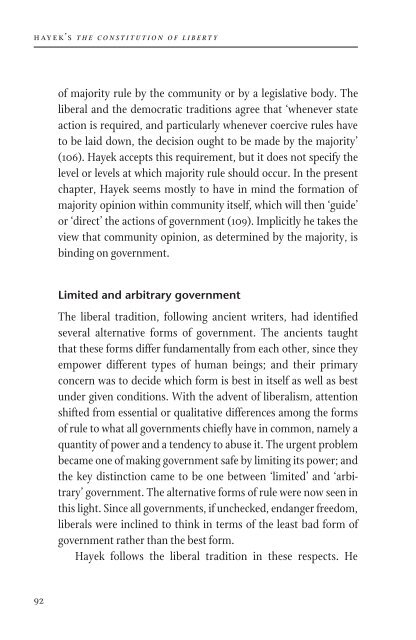Hayek's The Constitution of Liberty - Institute of Economic Affairs
Hayek's The Constitution of Liberty - Institute of Economic Affairs
Hayek's The Constitution of Liberty - Institute of Economic Affairs
You also want an ePaper? Increase the reach of your titles
YUMPU automatically turns print PDFs into web optimized ePapers that Google loves.
h ay e k ’ s t h e c o n s t i t u t i o n o f l i b e r t y<br />
m a j o r i t y r u l e a n d l i m i t e d g o v e r n m e n t<br />
<strong>of</strong> majority rule by the community or by a legislative body. <strong>The</strong><br />
liberal and the democratic traditions agree that ‘whenever state<br />
action is required, and particularly whenever coercive rules have<br />
to be laid down, the decision ought to be made by the majority’<br />
(106). Hayek accepts this requirement, but it does not specify the<br />
level or levels at which majority rule should occur. In the present<br />
chapter, Hayek seems mostly to have in mind the formation <strong>of</strong><br />
majority opinion within community itself, which will then ‘guide’<br />
or ‘direct’ the actions <strong>of</strong> government (109). Implicitly he takes the<br />
view that community opinion, as determined by the majority, is<br />
binding on government.<br />
Limited and arbitrary government<br />
<strong>The</strong> liberal tradition, following ancient writers, had identified<br />
several alternative forms <strong>of</strong> government. <strong>The</strong> ancients taught<br />
that these forms differ fundamentally from each other, since they<br />
empower different types <strong>of</strong> human beings; and their primary<br />
concern was to decide which form is best in itself as well as best<br />
under given conditions. With the advent <strong>of</strong> liberalism, attention<br />
shifted from essential or qualitative differences among the forms<br />
<strong>of</strong> rule to what all governments chiefly have in common, namely a<br />
quantity <strong>of</strong> power and a tendency to abuse it. <strong>The</strong> urgent problem<br />
became one <strong>of</strong> making government safe by limiting its power; and<br />
the key distinction came to be one between ‘limited’ and ‘arbitrary’<br />
government. <strong>The</strong> alternative forms <strong>of</strong> rule were now seen in<br />
this light. Since all governments, if unchecked, endanger freedom,<br />
liberals were inclined to think in terms <strong>of</strong> the least bad form <strong>of</strong><br />
government rather than the best form.<br />
Hayek follows the liberal tradition in these respects. He<br />
classifies governments mainly according to whether they are<br />
limited or arbitrary, so the form <strong>of</strong> rule becomes a secondary<br />
consideration: ‘It is not who governs but what government is<br />
entitled to do that seems to me to be the essential problem’ (403).<br />
By limited government, Hayek understands one in which the use<br />
<strong>of</strong> coercive power is constrained by general rules that are well<br />
established and effective. By arbitrary government, he understands<br />
political rule that is not constrained by law. Arbitrary<br />
government, in all <strong>of</strong> its forms, endangers liberty.<br />
Democracy versus elite rule<br />
Ins<strong>of</strong>ar as the various forms <strong>of</strong> rule are concerned, Hayek distinguishes<br />
mainly between government by the few, or elite rule, and<br />
government by the many, or majority rule. He subsumes both<br />
alternatives – elite rule and majority rule – under his primary<br />
distinction between ‘limited’ and ‘arbitrary.’ This means that<br />
there can be limited governments <strong>of</strong> either an elite or a democratic<br />
form. Alternatively there can be arbitrary governments <strong>of</strong><br />
either form. Thus, for example, elite rule can be a limited government,<br />
while democratic rule can be <strong>of</strong> the arbitrary type. <strong>The</strong> key<br />
question is whether the ruling body subordinates itself to the law.<br />
<strong>The</strong> desirability <strong>of</strong> elite rule obviously depends on the qualities<br />
<strong>of</strong> this select group. In line with the liberal tradition, Hayek<br />
rejects claims to power based merely on an advantageous birth or<br />
on superior wealth. <strong>The</strong> only kind <strong>of</strong> elite rule worthy <strong>of</strong> consideration<br />
is that <strong>of</strong> ‘the wisest and best informed.’ Hayek grants the<br />
possibility that ‘in any given state <strong>of</strong> affairs, government by some<br />
educated elite would be a more efficient and perhaps even more<br />
just government than one chosen by majority vote’ (108). Even<br />
92<br />
93












